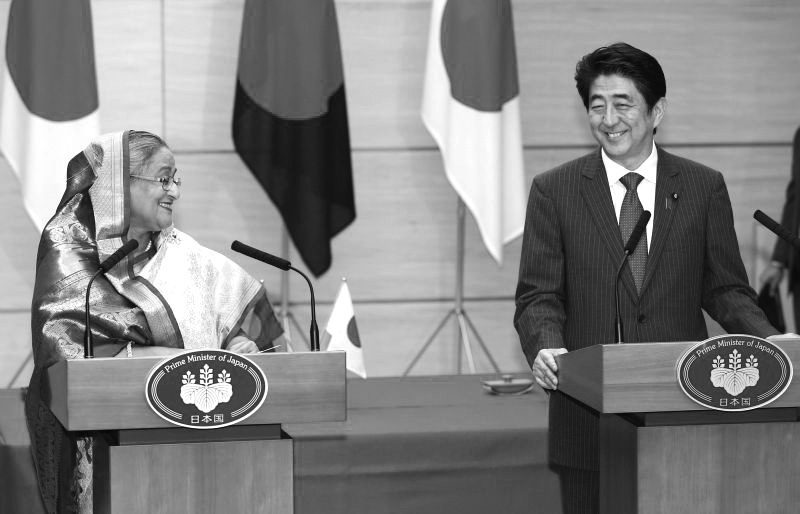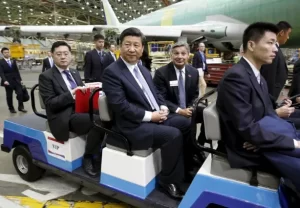Japan has been a trusted friend since the emergence of Bangladesh as an independent state. Though the role of Japan in nation-building of a nascent state and continuing further support had been less hyped, Japan remained a friend despite all the differences. The extended friendship traced back to the events of hijacked airliner in October 1977, when Bangladesh successfully handled the hostage crisis and earned the trust of Japanese policy makers. Bangladesh as a sign of expressing gratitude has never been stingy as all the former heads of government of Bangladesh visited Japan and urged to strengthen bilateral relations.
Economic Cooperation: A Win-Win Trade-off
The geographical location of Bangladesh is very important as it acts as a portal between South Asia and South East Asia. This importance has been reverberated in the hopes of Japanese Premier Shinzo Abe’s last visit to Dhaka. The last visit is important to dissect not only for the formal cooperation assistance settings but also for geopolitical importance as well. As soon as Abe took office, his administration began robust diplomatic engagements with the Asian nations. All these tours point on the unavoidable realist fact, namely countering its potential enemy China’s influence geopolitically in the region and beyond the region. Behind this backdrop of all economic cooperation assistance promised, Japan’s intention to assist building these nations indicate a more direct involvement in the sphere of influence.
Bangladesh exchanged its position to compete its candidature for the election of the non-permanent members of United Nations next year to Japan with a big chunk of financial assistance. That is a win-win for both Japan and Bangladesh. Japan wants to have a more prominent presence in the international institutions as China has been blocking its position in the United Nations. Trade has worked as lifeline for Bangladesh growth of which FDI worked as blood. Japan promised a total six billion dollar of Japanese investment in Bangladesh, which is something Bangladesh cannot ignore. Japanese motive has been solely based on its national interests- to secure more geo-political space to boost its economy. However the experts argue that the ventures agreed by both the parties will be mutually beneficial as Bangladesh will gain in both short term and long term from infrastructural development and Japanese technological spill over.

May 26, 2014. Hasina is in Japan for a four-day visit. REUTERS/Shizuo Kambayashi/Pool (JAPAN – Tags: POLITICS)
Both Bangladesh and Japan commemorated the earlier and most recent efforts from counterparts to facilitate the bilateral economic relations. Japanese premier ensured that the concerning authorities from Japanese side will review the provisions of the rules of origin to facilitate import of knitted articles from Bangladesh. Prime minister Sheikh Hasina expressed her hope of small and medium enterprise Japanese investment in the fields of technology.
Bay of Bengal Industrial Growth Belt (Big-B Initiative)
The most talked of aspect of the recent visit is the “Bay of Bengal Industrial Growth Belt” or shortly popularized as Big-B initiative. Japanese foreign ministry noted that this initiative is directed “at cooperation in infrastructural development, the improvement of investment environment and regional connectivity”. Japan, under this initiative, is going to use all of its modern technologies; particularly in the fields of transportation, energy and urban and private sector development. The three pillars to this initiative are- developing economic infrastructure, improving investment environment and fostering connectivity.
Japanese investors have been withdrawing its investment from China and will invest in Indian Ocean rim countries. This is an opportunity that Bangladesh has taken seriously and assured to give an Exclusive Economic Zone (EEZ) to Japan. All the earlier assistances provided by Japan shaped to erect a workable socio-economic structure and now such ventures will be directed primarily on advancing industrial development in Bangladesh.
Nuclear Energy Cooperation
Stable energy supply is a prerequisite for the sustainability of economic growth of Bangladesh. Bangladesh’s energy sector has been criticized due to chronic power shortage, inefficient management and not being clean. Sustainable & Renewable Energy Development Authority (SREDA) has been set up but yet to perform making visible differences from the traditional dirty and unsustainable processes of generating electricity. A nuclear powered plant in Pabna is yet to be operationalized. The old plants need to be converted from phase-wise into combined cycle plants. These are the sectors where Japan can come into play..
The need for stability of energy sector is also included in Big-B initiative. From the joint statement of the recent visit of Premier Abe, it is expected that both Japan and Bangladesh are going to sit for an expert level meeting on peaceful and safe use of nuclear energy soon. Apart from that the largest coal-powered power plant will be operational by 2023 with the capacity of producing 1200 MW electricity on Matarbari island near Maheshkhali. JICA will provide a $3.8 billion soft loan out of total production cost of $4.5 billion.
Cultural Diplomacy and Visa Free Regime
In order to deepen cultural and educational ties both the parties urged the necessity for greater cultural and educational exchange programmes. High-level interactions, particularly at high political and government officials and people to people contact at Track II sphere, are stressed for better cooperation as a whole. Information and knowledge sharing through technical cooperation and capacity building at government and non-government level are also stressed for well-informed policy decisions and improved delivery system of the services.
Another notable development between Bangladesh and Japan is visa relaxation for official passport holders. The initiative is expected to make visa process easier so that people-to-people contact may improve between these two nations. Such initiative will help to break the existing barriers between Japan and Bangladesh. Japan will be the first developed country ever to provide opportunity for Bangladesh’s diplomats to facilitate visa-free entry. This step will bring some secondary impacts particularly bridging the gaps and more warmed up relations. People to people contact will enhance development cooperation on non-government level, education, health and capacity building.
Cultural issues will also be addressed in future, urged in the joint declaration. It is imperative to understand the culture of both of the nations to learn and teach mutually. Japanese government provides opportunities for higher studies and exchange visits for the students and professionals which need to be increased in future for a renewed, better and robust communication and exchange of ideas.
Agriculture
This sector has a bigger stake in fulfilling macro-economic objectives of Bangladesh. Bangladesh has already achieved food security but in order to make it sustainable more attention in this sector is required. This visit will ensure investment to improve food productivity, crop diversification and the development of the agricultural infrastructure. It is imperative to ensure that the producers get the real benefit of the investment in order to make the livelihoods of the farmers sustainable. Such efforts will ensure food security, food safety, sustainable economic growth and environmental management.
The creation of food value chain from farmers to consumers is important and had been stressed from both the sides. It is agreed that a greater economic cooperation is essentially required to sustain the goals related to food production, food safety and food security.
Environment and Disaster Management
Bangladesh is situated at the active earthquake zone. Japan’s experience is of great importance for Bangladesh to take lessons and replicate to assess and minimize the future risks. The prime ministers have agreed to share information on and management of natural disasters, particularly earthquakes, floods, cyclones and sediment related disasters, for research and education. Japan has ensured that technology transfer and a framework of cooperation will be of great help to Bangladesh and will be facilitated. The natural conservation, sustainable water management, water transports etc. are some areas where Japan can hop in. Japan’s help in sustainable waste management in Bangladesh is already applauded yet there are lot of portals open where Bangladesh can benefit from the technological assistance from Japan. Both of the parties expressed the hope to promote investment in low carbon technologies.
Concluding Remarks
Apart from all these mentioned aspects concerns on peace and security, particularly fight against terrorism, peace and stability of the region and the world, UN peace keeping operations, establishment of peace building centre in Dhaka, situation in Gaza and statehood for Palestine, DPRK’s missile and nuclear enrichment programme, refugee from Myanmar were discussed between the two premiers. Concerns for cooperation on the mutually beneficial issues at regional and international forums were also discussed during the recent visit of Shinzo Abe.
The visit will be of political, economic and historical importance for both the countries. Both Japan and Bangladesh gain from trade and investment, mutual cooperation on different aspects. While Bangladesh made a concession by giving her support to Japan for next UN Security Non-permanent election so that Japan may have a greater say, there Bangladesh gain from a trade-off of six billion dollar of financial assistance. The long term impacts are far reaching as the parties will be benefitted from mutual knowledge sharing and learning from each other.
[1] Ministry of Foreign Affairs of Japan, available at: http://www.mofa.go.jp/s_sa/sw/bd/page23e_000340.html, accessed on 6 December 2014.
[1] The Financial Express, available at: http://www.thefinancialexpress-bd.com/2014/09/07/54806, accessed on 6 December 2014.
[1] BDNews24, available at:http://bdnews24.com/bangladesh/2014/09/06/bangladesh-japan-to-enhance-cooperation-on-safe-nuclear-energy-uses, accessed on 6 December 2014.
[1]The Daily Star, available at: http://www.thedailystar.net/frontpage/target-a-complete-electricity-hub-36913, accessed on 6 December 2014.
The writer is a Research Officer at Bangladesh Enterprise Institute.







